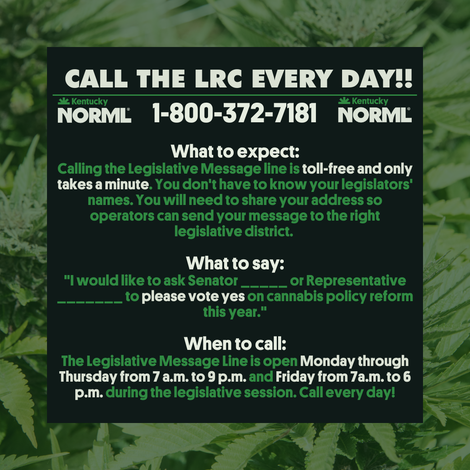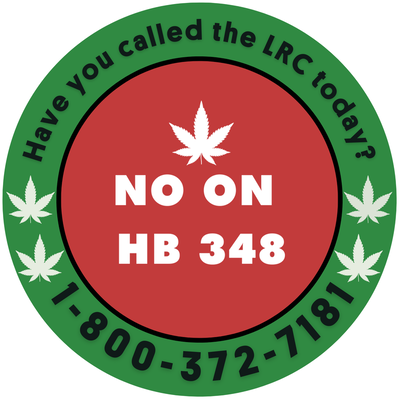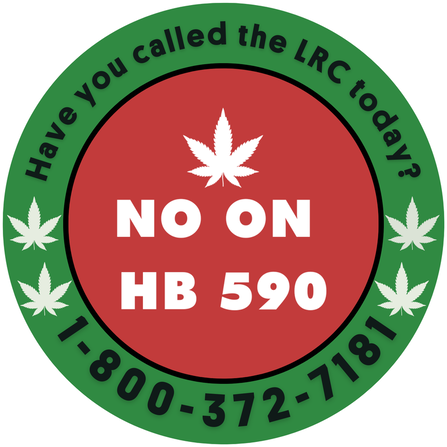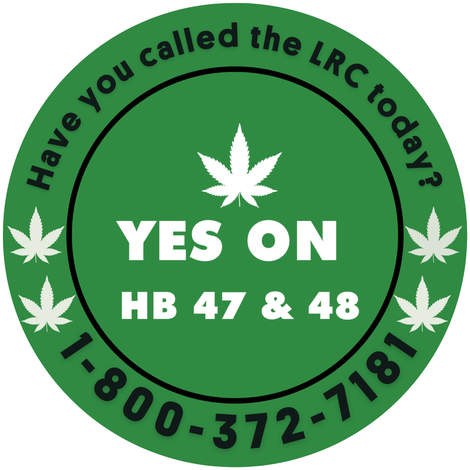|
We're halfway through the 2023 Kentucky General Assembly. We thank you for every call, email, and meeting by Kentuckians to State Legislators supporting cannabis policy reform. We firmly believe that every action, no matter how small, is significant and impactful. Kentucky NORML is dedicated to strengthening our grassroots movement for cannabis policy reform. We're grateful for the legislators who share our perspective on the urgent need for medical cannabis and are responsive to the needs of Kentuckians. However, there are too few leaders who prioritize the interests of their constituents in Frankfort. Kentucky GOP leadership has spent years stalling on medical cannabis using easily refuted concerns and seeking taxpayer money for more research. We do not believe these calls are sincere, but a stall tactic. The research has already been conducted. Since 2010, scientists have published over 30,000 peer-reviewed papers specific to cannabis, with the annual number of total papers increasing every year. This information is widely available to those who wish to review it. We should be discussing what we do know about cannabis and what it can do for Kentuckians, not emphasizing what we don’t know. To ensure that Senate and Leadership were fully aware of this research, we hand delivered NORML’s “Clinical Applications For Cannabis & Cannabinoids: A Review of the Recent Scientific Literature” to every current Kentucky Senator on February 14th. This publication alone cites over 450 studies and assesses the use of cannabinoids in various patient populations. In all cases, science has sufficiently made the case that cannabis is safe and effective. This fact should no longer be the subject of any serious debate. Despite these challenges, Kentucky NORML and its supporters continue to make our voices heard. Thank you for your ongoing dedication to supporting cannabis policy reform in Kentucky. Bookmark Kentucky NORML's Cannabis Bill Tracker stay updated and informed on all the cannabis bills in play this session.
Call the legislative hotline at 1-800-372-7181 and leave a message voicing support or your opposition for the following bills. Please do this once a day for maximum effect.
0 Comments
HB 488 is a bill introduced by Representative A. Gentry with the aim of improving the current worker's compensation system. The bill proposes to exclude certain levels of delta-9 tetrahydrocannabinol (THC) in the blood from being used as evidence to assume that an injury was caused by the introduction of that substance. This move is a step towards ensuring that individuals who are injured on the job are not unfairly denied compensation simply because they have THC in their system.
The supporters of this bill argue that the presence of THC in the body does not necessarily indicate impairment, as THC can remain in a person's system for up to 30 days after use. Therefore, relying on the presence of THC in the blood as evidence of intoxication during the time of the injury is not scientifically sound. HB 488 aims to address a gap in the worker's compensation system by ensuring that individuals who have THC in their system are not automatically denied compensation. This bill is a step towards a fairer and more just system that takes into account the latest scientific research on THC and its effects on the human body. House Bill 348 is currently being criticized as an attack on the hemp industry, as it represents yet another example of the Republican party attempting to restrict and enforce more regulations on an already struggling industry.
The hemp industry in Kentucky has been suffering from the negative impacts of previous legislation and regulatory actions by the Department of Agriculture. These harmful regulations have caused almost irreversible damage to Kentucky's hemp farmers, who were once leaders in the fledgling industry. After only a few short years of these bad regulations, the industry has been severely impacted and is now just a shadow of its former self. Given this situation, farmers, retailers, and processors in the hemp industry deserve better treatment from the state. As a result, many people are strongly opposed to the current bill and view it as an additional burden on an already struggling industry. 2/25/23
These two bills, SB 266 and SB 269, aim to regulate the possession and use of intoxicating hemp products. SB 266 proposes to prohibit individuals under the age of 21 from possessing such products, while SB 269 seeks to prevent driving under the influence of these substances. The support for age limits on the sale of intoxicating hemp products is based on the concern that young people are more susceptible to the negative effects of these substances, including impaired judgment, cognitive deficits, and addiction. By restricting access to such products, it is hoped that the potential harm to young people can be minimized. The support for the prohibition of driving under the influence of intoxicating hemp products is based on the fact that these substances can impair driving ability, reaction times, and coordination, increasing the risk of accidents and injury. The recommendation of waiting four hours before operating a motor vehicle after partaking in these substances is in line with the guidelines for alcohol consumption, which similarly recommend waiting before driving. However, a challenge with regulating the use of intoxicating hemp products is the lack of standardized methods for assessing intoxication. Unlike alcohol, which has established breathalyzer tests to determine blood alcohol content, there is currently no widely accepted method for measuring the level of cannabinoids in a person's system to determine impairment. As a result, there may be concerns about arresting individuals who have cannabinoid metabolites in their system, but who may not be actually intoxicated at the time of the arrest. KY HB590 - AN ACT RELATING TO MEDICINAL CANNABIS Introduced Session: 2023 Regular Session Bill Summary: Create a new section of KRS Chapter 218A to define "cannabis"; require the Kentucky Center for Cannabis to establish criteria for determining when sufficient data exists to support the use of cannabis for medicinal purposes; permit the center to produce and dispense cannabis products to certain patients; permit the center to establish and operate cannabis dispensing centers throughout the state, exempt patients who receive cannabis products from the center from prosecution for a violation of KRS 218A.1421, 218A.1422, or 218A.1423. Subject: Cannabis Drugs and Medicines Education, Higher Health and Medical Services Sponsors (2): Kimberly Moser (R)*, Thomas Smith (R), 2/23/23 Medical cannabis has been a hot topic for legislators in Kentucky for the past several years, and Representative Kim Moser's bill, HB 590, has caused controversy among those who support it. The bill seeks to leave the decision on whether or not Kentucky gets a medical cannabis program up to the Kentucky Center on Cannabis, established by Moser in a previous session. However, the Center for Drug and Alcohol Research, which oversees the Center, has a history of demonizing cannabis and cannabinoids and spreading debunked Drug War propaganda. The lead researcher at the Kentucky Center for Cannabis, Dr. Shanna Babalonis, has little experience with clinical studies and from all accounts has had a difficult time getting and retaining research subjects. Moreover, the research the Kentucky Center for Cannabis is currently doing is not novel or groundbreaking, but merely rehashing studies from other facilities with better funding and knowledge bases. KY HB 590 is nothing more than bad-faith, self-serving legislation meant to continue denying the people of Kentucky access to cannabis. Despite more than 30,000 scientific and clinical studies on cannabis and cannabinoids in the last decade, this bill claims to determine whether sufficient scientific data and evidence exist to demonstrate the medical, therapeutic, or palliative benefits of cannabis. House Bill 590 leaves all aspects of a medical cannabis program to the University of Kentucky through its related research departments, which has no experience in growing cannabis to scale, knowledge of the different cultivars and their uses for specific medical conditions, or setting up a distribution network. The decision for medical cannabis would be left in the hands of uninformed, unprepared, and unsuited unelected state employees who are beholden to their financiers from pharmaceutical, insurance, and anti-choice organizations. We view this effort as waste of taxpayer money. At least $2 million is appropriated from Kentucky taxpayers, who will also fund the growing facilities, distribution, and implementation needs for a medical cannabis program. The trial and error research that will bring us no further to any understanding of the cannabis plant that hasn't already been done will be paid for by the Kentucky taxpayer. Rep. Moser's HB 590 is not the reform that the people of Kentucky need. Instead of wasting time and money on a program that will likely fail, legislators should focus on the existing scientific data and industry standards for dosage guidelines and appropriate methods of consumption for cannabis. Instead of a big-government program taking the lead, private enterprises should have a role in growing, processing, and distributing cannabis, and legislators should not be beholden to special interest groups. The people of Kentucky deserve better. KY HB 590KY HB47 - AN ACT relating to cannabis.
Introduced Session: 2023 Regular Session Bill Summary: Create a new section of KRS Chapter 218A to make possession of a personal use quantity of cannabis exempt from civil or criminal penalty; amend KRS 218A.010 to define "cannabis," "personal use quantity of cannabis," and "cannabis accessory"; amend KRS 218A.1422 regarding cannabis possession to conform; amend KRS 218A.1423 regarding cannabis cultivation to conform; amend KRS 218A.500 regarding drug paraphernalia to exempt personal use cannabis accessories; amend KRS 218A.1421 on cannabis trafficking to exempt personal use quantities; amend KRS 138.872 to exclude personal use quantities from cannabis stamp tax; amend KRS 218A.410 and 533.030 to conform; create a new section of KRS Chapter 431 to allow expungement of certain convictions relating to cannabis; apply Section 10 retroactively. Subject: Civil Procedure Corrections Impact Courts Crimes and Punishments Drugs and Medicines Peace Officers and Law Enforcement Retroactive Legislation Taxation Sponsors (5): Nima Kulkarni (D)*, George Brown (D), Lindsey Burke (D), Alan Gentry (D), Sarah Stalker (D), Last Action : to Appropriations & Revenue (H) (on 02/23/2023) KY HB48 - AN ACT proposing to create a new section of the Constitution of Kentucky relating to the possession of cannabis. Introduced Session: 2023 Regular Session Bill Summary: Propose to create a new section of the Kentucky Constitution to guarantee the right of an individual 21 years of age or older to possess, use, buy, or sell one ounce or less of cannabis and to cultivate, harvest, and store up to 5 cannabis plants for personal use; and for the production, processing, and sale of cannabis and cannabis-derived products to be controlled by the General Assembly; specify the question to be printed on the ballot; direct the Secretary of State to publish the proposed amendment in a newspaper of general circulation; direct the Secretary of State to certify the proposed amendment to the county clerk of each county. Subject: Cannabis Constitution, Ky. Corrections Impact Drugs and Medicines General Assembly Licensing Sponsors (4): Nima Kulkarni (D)*, George Brown (D), Alan Gentry (D), Sarah Stalker (D), Last Action: to Committee on Committees (H) (on 01/03/2023) 2/25/23
Decriminalization refers to the process of removing or reducing criminal penalties for certain actions that were previously considered illegal. In the context of cannabis, decriminalization typically means removing criminal penalties for possession of small amounts of cannabis for personal use. HB 47 and HB 48 are bills proposed in the legislative session by Rep. Nima Kulkarni, along with other sponsors. These bills aim to decriminalize the possession of small amounts of cannabis for personal use in the state of Kentucky. If these bills were to become law, individuals caught in possession of small amounts of cannabis for personal use would no longer face criminal charges or the possibility of jail time. Instead, they would face civil penalties, such as a fines or community service. The rationale behind decriminalization is that criminalizing cannabis possession disproportionately affects marginalized communities, and that the current criminal justice system often imposes harsher penalties on those communities. Decriminalization also allows law enforcement to focus on more serious crimes, rather than spending time and resources on minor drug offenses. It's important to note that decriminalization is not the same as legalization. Decriminalization only removes or reduces criminal penalties for certain actions, while legalization allows for the sale and possession of cannabis for recreational or medical use, subject to regulation and taxation. |
Cannabis Business
|
ABOUT • SHOP • DIRECTORY • JOIN • CONTACT US










 RSS Feed
RSS Feed